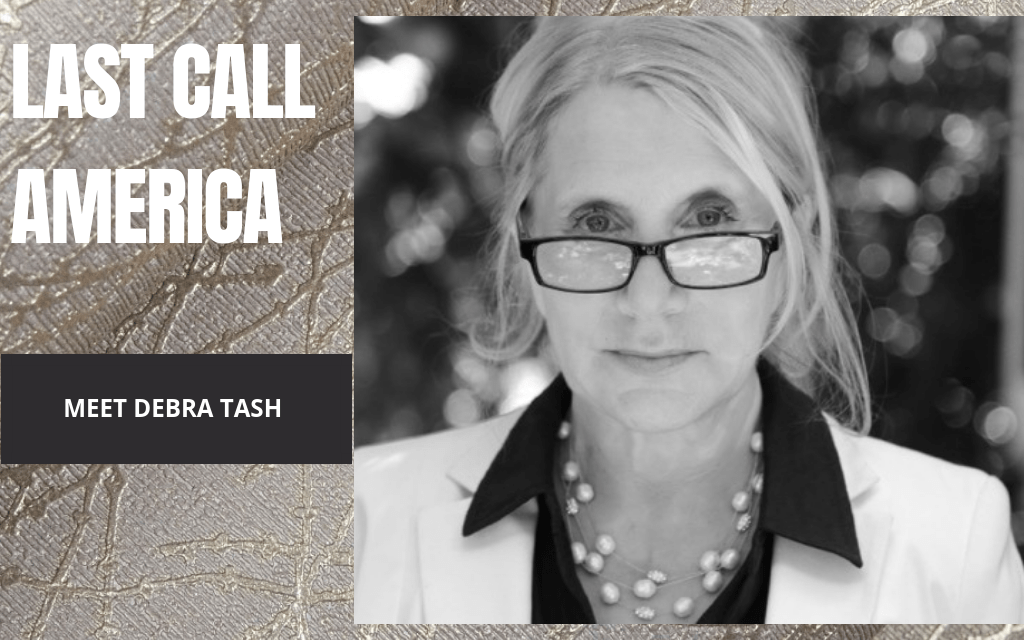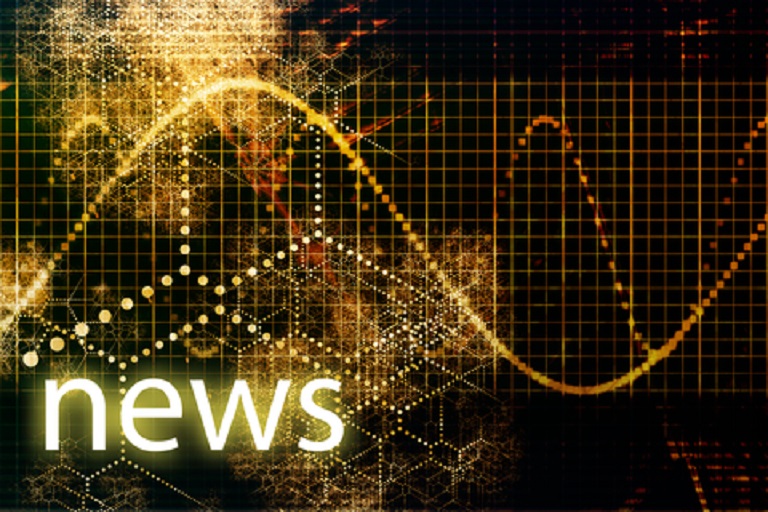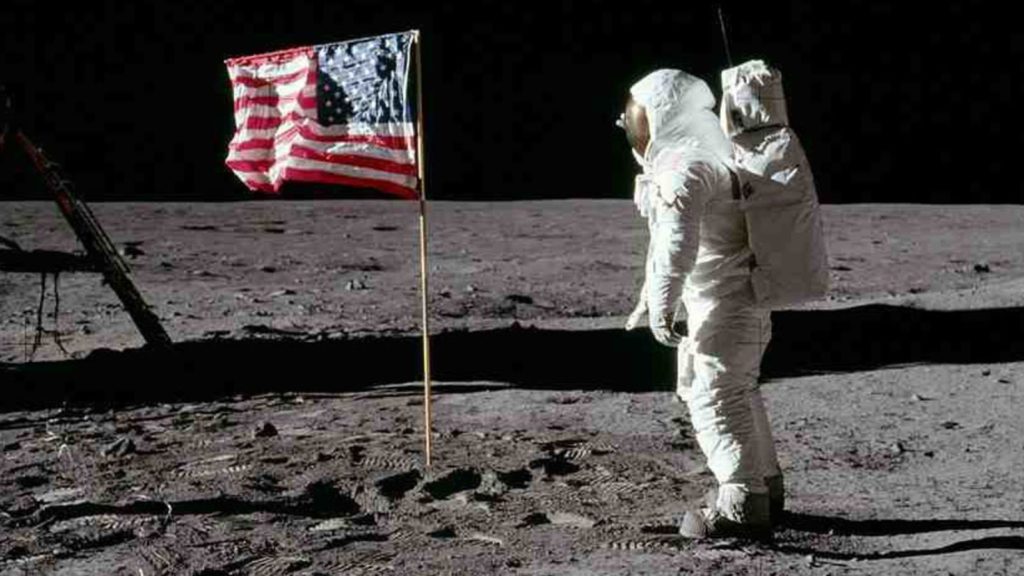Times will try us, challenge our courage, but we will survive. Last Call, America – Available on Amazon.com
by Debra Tash
Times will try us, challenge our courage, but we will survive. Last Call, America – Available on Amazon.com
by Debra Tash

Last Call America!
Debra Tash is an award-winning American author, journalist and accomplished speaker. Her books have won multiple awards and been sold nationwide. Debra was born in Los Angeles where she honed her writing skills through various creative outlets including painting, with a few of her pieces touring internationally in Japan.
She gets her inspiration from current and past events, Debra Tash focusing on positive morals and uplifting themes. Her most recent book “Last Call America” focuses on the not so distant future and takes the current American political climate to a chilling collision.
From columnist Rich Eber’s review: “Last call America is a page-turner…the pay-off is a thought-provoking book which is well worth spending the time to read.”
Vertikal spent a delightful time with Debra Tash interviewing her on a Taste Of Ink Live. Enjoy!
What is your writing Kryptonite? DT: It’s what is interesting to me. I have written on ancient history, on events during the founding of our nation and now my latest, set in the not so distant future. It’s seeing all of human history, the elevated perspective, that nothing is new under the sun. We make the same mistakes. This gives me that Kryptonite, the key inspiration to write, at times light heartedly, at others with a sharp edge.
What literary pilgrimages have you gone on? DT: I’ve traveled to Europe, mostly Italy, marveled at what others have left behind, monuments, ideas, hopes. The travel that affected me the most is visiting the battlefields of our own American Revolution. To see the Valley Forge encampment and know that with the harsh conditions they endured, the lack of pay and support, the army should have deserted. But what the enlisted were there for was larger than their leadership, the Congress, their generals. They were there for their individual freedom which so much larger than who is in command or who is in power. Every one of them had their own dream, and they wanted to win it. That was very inspiring.
Do you want each book to stand on its own, or are you trying to build a body of work with connections between each book? DT: This book will stand on its own. I do have it in three parts but decided to release it as a whole. I have a body of work but it is work that I wanted to do, was inspired to do, that was entertained doing it. That is my body of work.
If you could tell your younger writing self-anything, what would it be? DT: Get your work out sooner. Don’t be afraid of rejection, criticism, be bold. Don’t look for affirmation out there. Know you’ve done the best you could and say it.
How did publishing your first book change your process of writing? DT: I have been published by smaller houses, micro-publishers. I learned that I can’t write for the market because by the time I finished the market changed. I just knew I had to go on and perfect my craft.
What was an early experience where you learned that language had power? DT: Language does have power. These days, with information overload and sound bites, crafting that bite that will stick with people. That phrase they can take with them is much more powerful than a million words of prose. Learning to write that phrase, that memorable character, that use of spoken and written language that stays with your listener/reader is real power.
How many unpublished and half-finished books do you have? DT: More than I can even remember. When I shuffle off to Buffalo I have to leave a note in my closet, “Enter at your own risk.” You have to learn when to walk away from a project.
What does literary success look like to you? DT: To have someone say/write that the book/article that I wrote stuck with them beyond the moment that they were entertained. That is the real success.
Do you read your book reviews? How do you deal with bad or good Ones? DT: I do. It sometimes means something and is helpful. What isn’t is the ones where they just knock your work, come out of the blue and for leaving me asking, did they even read it? This is for the good or the bad. If it’s relevant I pay attention.
What did you edit out of this book? DT: So much in this one. I have a critique group and there was one person in it who absolutely despised one of my main characters. I first envisioned that character as a foil for the key protagonist. With my critique partner’s input the character developed, the arch evolved until he became a hero. Writing is a journey for both the author and the writer.
Hear Taste of Ink LIVE by C. Stene Duckworth’s Interview with Debra Tash
https://www.mixcloud.com/TasteOfInkLive/a-taste-of-ink-live-with-author-debra-tash/
by Debra Tash
Come by and see Debra on April at the Los Angeles Festival of Books | April 13th 1 PM to 3 PM
Location: University Park Campus, Los Angeles, CA 90089 (USC)
Booth: 956 (Black Zone)

by Debra Tash
We’ve always cherished our rights outlined in one of the most unique documents in history. The majority of our framers considered the Constitution clear in what it guaranteed. However, George Mason, a neighbor of General Washington, insisted on even more assurances that the newly formed government would not tread on the individual. Mason’s Declaration of Rights influenced James Madison, the author of the first ten amendments to our constitution.
One of those rights, the very first, secures the freedom of the press along with the right to assemble and the freedom of religion and speech. This is something that many other nations, even some western nations, do not readily guarantee.
Our current press (print and other media) touts its right to publish whatever they deem fit above all the other freedoms in the Bill of Rights. This sometimes is done at the cost of common sense and even decency. Lately, it’s anything goes, even though it may not even be verified.
Recently we’ve been saturated with smut from pron stars to language that would make my late mother blanch. If it serves an agenda, it’s just fine. It doesn’t fall under what is “politically correct” or even what you would want your nine year old to hear, if it serves your agenda. Just print it, say it, spread it, even if it’s in bad taste or isn’t even true. You can give your mi culpas later, put out a retraction. But in the connected world of the internet, it will never die.
We’re bombard every single day with what passes for news now.
Kellyanne Conway, counselor to President Trump was slammed for saying, “alternative facts,” in a soundbite given to NBC’s Chuck Todd. Misspoken, perhaps? Perhaps not. Whatever she meant, the media itself is guilty of – alternative facts are an every day ingredient for what our present day crop of journalists cook up and feed us.
Take, “Drape Gate” from the New York Times. They claimed in an article that UN Ambassador Nickki Haley’s office paid $52,701 for curtains in an apartment rented on the federal time for the ambassador’s use. However it was under the Obama administration that the expensive apartment had been rented and the curtains ordered. The Times had to backtrack on its story while the Washington Post ran with a story that the Times was taken out of context. If you read the Times headline, “Nikki Haley’s View of New York is Priceless. Her Curtains? $52,701.” it was pretty clear of the context.
It seems much of the news has become nothing more than spin. Every story has an angle, true. However it’s the way you tell it, keeping in mind that it should and foremost be the truth. It would also help if they left off the smut, swear words and passed on the cruder content they’re spewing. I don’t need to know about the shape the president’s private part. No thank you, CNN, but if that’s the news you want to broadcast, I don’t have to tune in. You have the right, I suppose. And I have the right to say, some of what passes for news these days belongs at the bottom of an electronic bird cage.

by Debra Tash
The new movie, “First Man” has proved once more that Hollywood is incapable, if not downright unwilling, to admit this country is astonishing in what it has accomplished. One of the most iconic images from the 7/20/1969 first moon landing was left out of the film. In this version of Tinsel Town history, Neil Armstrong isn’t shown standing by the American flag he’d planted on the surface of our nearest celestial neighbor. Why? Because both the film’s lead, Ryan Gosling, and its director, Damien Chazelle viewed the landing as a human milestone, not an American one.
“I think this was widely regarded in the end as a human achievement [and] that’s how we chose to view it,” he said. “I also think Neil was extremely humble, as were many of these astronauts, and time and time again, he deferred the focus from himself to the 400,000 people who made the mission possible.” Ryan Gosling, The Daily Caller
In some sense, that’s true. Every undertaking, good or bad, are ones that are enacted by human beings, singularly or by many. However, whatever they have done has been fostered by their environments. The moon landing, and what it meant to all mankind, was born of a freedom to express our creativity, to reach for that goal as stated by the late John F. Kennedy in his speech on September 12 1962: “We choose to go to the moon in this decade and do the other things, not because they are easy, but because they are hard, because that goal will serve to organize and measure the best of our energies and skills, because that challenge is one that we are willing to accept, one we are unwilling to postpone, and one which we intend to win, and the others, too.”
America, for all its growing pains, has fostered the best of ourselves because its one of the most successful constructs in our species’ history. Here the individual is sovereign.
It is in the individual mind and heart where great things are first conceived. The fabric of America allows for creativity to thrive. Global group think kills inspiration.
Okay, Mr. Gosling, 400,000 people may have made it possible to land on the surface of the moon but they were all individuals who lived in a country where their efforts were encouraged to bear fruit. There are so many milestones in the history of humanity, and there are a remarkable number of them crammed into the short span of the American experiment.
Hollywood, once more, has got it wrong. Landing on the moon was an American undertaking accomplished for all humanity.

by Debra Tash
The way we glean our information has changed, and changed big time. No longer relying on the daily/weekly news sources, we get what we want to know by googling for it or, worse yet, what pops up on our social media feeds and smart phone.
Free speech is being silenced by the gate keepers. Alphabet (the holding company of Google and Youtube), Facebook, Twitter et el, have become the masters of OUR universe. They wielded tremendous power and have put their boot against the throat of speech they deem unfit and that does not supposedly meet their community standards.
Yet who sets those standards? The Southern Poverty Law Center for one, which is an avowed leftist organization. And they also regulate it by their own internal standards. The latest of those targeted is InfoWars, which has recently been banished from the Youtube platform.
Now I’m not defending that website, which I hardly ever read. It contains content that I don’t readily agree with and, at times, find offensive. Yet, I am going to defend their right to say what they want. Truthfully I find Antifa absolutely offensive. They not only advocate violence, they carry it out and infringe on others people’s rights to assemble and to rally. Yet you will find them across every platform.
Social Media and search engines are private enterprises with reaches that were unthinkable in the time of our founding. I am not advocating they be regulated. That is the very slippery slope of censorship taken from private enterprise to government control. However, their platforms need to be abandoned and to let market forces dictate their existence.
When the gate keepers close access to one side sure enough the other is next. We will be fed the pabulum of mindlessness. Accepting as truth what is on Wikipedia, which can be edited by anyone and which comes up near the top of most Google searches as the got to for facts. We will muzzle ourselves and our future if we bow down to the tech giants. Leave the platforms, find another way to search, make your own choice and don’t be led by any gate keepers. They will come for you next.
Tyrants always do.

by Debra Tash
By Richard Eber, California Political News and Views,
The book will be available in Spring 2018 at your favorite bookseller.
In real life author Debra Tash is a friendly, kind, and affable person who fits the definition of what one would like in a friend. But put her behind a word processor, the writer “Debra” in her recent novel Last Call America, Last Call Before Darkness Falls, pens a chilling tale about what transpires in a post constitutional USA which has been taken over by a totalitarian dictatorship
Homeland Security takes the place of democracy and representative government. Citizens are herded into the cities to work in factories. Those who actively resist are arrested and ultimately liquidated. Others who prefer the country lifestyle are starved to death by a central government which controls virtually every aspect of people’s lives.
If Last Call America sounds a lot like Aldous Huxley’s Brave New World or George Orwell’s 1984, there is good reason. All of these books belong in the genre of “dystopia.” While this world of a pessimistic, repressive, government with no regard to the plight of the people sounds more like a case for Doctor Phil to solve, it poses a real threat to our society today.
Stifling the first amendment, diluting religious Freedom, limiting job choice, unlawful taxation, disintegration of the family, and losing one’s identity are all issues to be reckoned with. Tash takes these important aspects of today’s America and places them in a society where a modern version of Big Brother controls all.
Naturally, there is major resistance to dystopian America. The heroine of Last Call America is Rebecca Sanders, a second generation opponent to the forces of evil. Things change for her when Jason Poole, a dashing army officer, walks into the diner she runs with her sister Tina in rural Massachusetts. Poole at first just wants a cup of coffee. This leads to a desire for outlawed black-market fresh eggs that come from a hidden coup on the property.
In time Rebecca and Captain Poole become lovers and join the resistance which resides on the other side of the border in Vermont. It is not a coincidence that the story unfolds in the same region where the Revolutionary War in the 1700’s took place.
Tash does a clever job of associating what went on then to the happenings of today. In a sense Last Call America has a large helping of historical fiction in its plot lines. Tash’s earlier novel, Challenge the Wind takes place during the revolutionary war in Pennsylvania. In a way Last Call America is what happens if the British had won and continued to repress the population.
The character of Rebecca Sanders is a strong women whose sense of purpose is not diminished by defeats on the battlefield as Homeland Security tries to quell the rebellion. To do so new weaponry is utilized called the “Charon” It is an electronic field that kills or maims everyone it touches much like a bolt of lightning. The only way it can be detoured is if shields are put in place to block its deadly force.
Gun enthusiasts should not be disappointed because these death rays are supplemented with conventional arms that the totalitarian government was not able to seize. Much of the second half of the book is taken up by the battle between the good guys and the fascist Homeland Security forces.
Ultimately Rebecca or “Honey Beck”, as the charming Texan Poole calls her, is able to triumph. As the book unfolds it is impossible to not see the resemblance with fictional character Dagny Taggart from Ayn Rand’s Atlas Shrugged. Rest assured our heroine is not destined to ride a train to Colorado to meet up with Hank Reardon or John Galt.
So what is to learned from Last Call America’s cautionary tale of big government gone wrong? According to Tash the reader hopefully learns:
Last call America is a page turner. Although parts of it are disturbing, (I had bad dreams one night) the pay-off is a thought provoking book which is well worth spending the time to read.

Richard Eber studied journalism at the University of Oregon. He writes about politics, culture, education restaurants, and was former city and sports editor of UCSB Daily. Richard is president of Amerasa Rapid Transit, a specialized freight forwarder.
Get Citizensjournal.us Headlines free SUBSCRIPTION. Keep us publishing – DONATE
Copyright © Debra Tash. All rights reserved. Privacy Policy